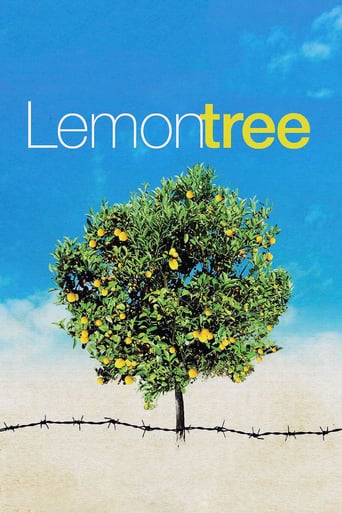[email protected]
"Lemon Tree" rehearses a phenomenon all too familiar in the conflict between the Israelis and the Palestinians -- the seizure of Arab property by the Israeli government. It's usually olive trees and the path of the Israeli security fence. Here it's a 50-year-old lemon grove across the road from the new home of Israel's defense minister. It pits a widowed Palestinian woman against the Israeli security apparatus, which is determined to protect the minister against the possibility of a terrorist attack. The main thing that's wrong with this premise is that an incoming defense minister is not going to build his house on the border (and the wife of the Defense Minister is not likely to leave him because the lemon grove is destroyed and she has developed an emotional connection with the Arab woman). There are any number of possible scenarios which could have made the confrontation entirely plausible, equally dramatic and far more realistic. It would have been better (in my view) if there had been a legitimate dilemma between the property rights of the Palestinian woman and the security needs of the Israeli authorities. Although I sympathized with the Palestinian woman as was intended, the situation was entirely too contrived. The director could have made the same film based on one the all- too-many actual incidents which have occurred.
aFrenchparadox
It's about dignity and hope in individuals. About a woman standing up for her rights and on the path freeing herself from social conventions. About another woman learning from simply observing the first one standing up to stand up too (though mostly for herself). About the fact that a nation can't be considered as having an unique position and that reality is always more subtle. Hence about the fact that hope can come from individuals who might change their nation, step by step (I am far too much an utopist on this one, given the outcome of the film). It's also (obvioulsy given the plot) about politics, and quite especially about public relations in politics. Especially also about how individual lives serve political interests, regardless of how these lives could evolve. The outcome doesn't reach the expectations you build watching the film, so it's finally also about how the Middle-East conflict is not ready to be solved, at least not within a short time. At last Hiam Abbass, playing the main character, is just amazing.
Linda
This film is rich in irony. It presents a microcosm of Israeli-Palestinian relations that go nowhere and lack empathy, but create torment for both sides. The Israeli Defense Minister and his wife (the Navons) move into a large, modern home at the Green Line, the border of the West Bank of the Jordan River to the east. Their neighbor is a middle-aged widow (Salma Zidane) who lives alone in a stone house and tends a lemon grove she inherited from her father from which she ekes a modest income. She is assisted by an elderly man who has worked for the family for 50 years. The defense minister's nervous security chief draws down on the two of them as they walk through the grove and surprise him. They never give each other more than uninterested glances. The defense minister accepts the advice that the grove must be cut down for security purposes.The widow receives notice written in Hebrew from a Hebrew-speaking soldier. She does not speak the language and goes to a town elder to translate, invading the all-male sanctum of a social hall. Although the letter offers the possibility of compensation, the elder warns her that her people do not ask the occupying Israelis for it. Soon the grove is fenced in and posted. When she sees the trees turning brown from lack of water and lemons spoiling on the ground, Salma climbs the fence in the long dress to care for the trees. She panics even the distracted soldier in the watch tower who spends time in the tower listening to tapes with inane sample questions to prepare for a logic test. He speaks Arabic, so they can converse.Salma finds a Palestinian attorney in town in a shabby office to take her appeal of the taking of her grove to Israeli court. His name is Daud and like the David of the Jewish Bible, he agrees to take on the giant. He doesn't ask for a fee. The minister's wife (Mira Navon) observes the widow several times. Their eyes meet, but they never greet. They wouldn't likely be able to speak a common language if they did and learn that they each have a child living in Washington DC whom they call. They are close in age and similar in appearance, tall and slim with long, brown hair. One dresses in pants suits, the other in dark long skirts and head covering in front of men. Mira asks her husband to dissolve the order to rescind the order to cut down the grove. He says he will rely on the decision of the Israeli security service. When the Navons throw a big housewarming party, they serve catered Mideastern food, taking care it is kosher for their politically connected orthodox guests. When they realize the caterer did not include an important item, lemons, they send a couple of soldiers to collect some from the fenced grove. When Salma sees them, she climbs the fence again and physically struggles with the soldiers, falling to the ground and being dragged briefly until the minister orders the soldiers to stop. The minister's wife apologizes in Hebrew, her first spoken words. The party is interrupted by gunshots coming from the grove. Armed soldiers search the widow's house for terrorists and leave its contents in shambles after they don't find anyone. Meanwhile their conflict attracts local, then international, news. The grove owner loses in the military court. She wants to appeal to the Israeli Supreme Court in Jerusalem. In the end the solution is not satisfactory to either side, not an uncommon result in litigation. Could the Israeli defense minister and the grove owner found a way to resolve their concerns in a mutually agreeable way? Probably if they had tried to talk. Both sides were defiant. Will their respective peoples be able to resolve their disputes and live in peace and cooperation for a better life? The film does not give as hope, but shows the need.
gradyharp
LEMON TREE (ETZ LIMON) is a film of quiet power, the kind of film that does not find it necessary to expose the audience to violence and conflagrations to make its point, but instead relies on the power of human reactions to carry the very heartfelt punch. Written by Suha Arraf and Eran Riklis (who also directs) the story is a deceptively simple one. The setting is the West Bank. On the Palestinian side of the border lives the widow Salma Zidane (the enormously gifted actress Hiam Abbass remembered best by American audiences for her luminous portrayal of the mother in THE VISITOR) who continues to tend her family's lemon grove alone, barely making enough money to support herself. Abruptly, on the Israeli side of the border, the government builds a house for the Israeli Defense Minister Israel Navon (Doron Tavory) and his beautiful and wisely sensitive wife Mira Navon (Rona Lipaz-Michael). Strange neighbors, these, more under the influence of the Israeli Secret Police who are assigned to guard the Minister than sensitive to the basic kindness of human decency. The Secret Service decides the lemon grove must be cut down to guard against possible terrorist access to the Minister, a declaration that sets off Salma's fear of losing her land and income. Salma seeks the help of young lawyer Zaid Daud (Ali Suliman) who bonds with her emotionally and legally and together they fight all the way to the Supreme Court to save the lemon trees. Fences are built, soldiers abuse the privacy of Salma, and the increased publicity in the media divides not only the peoples on both sides of the border but also the Navons: Mira empathizes with Salma, champions her rights, and though the two women never meet, the bond between them transcends the ages long hostilities between the Arabs and the Israelis. The result of the interpersonal conflict between the Navons and Salma is buried by the expected governmental insensitivity and the film ends with some sad surprises. The cast of this film, including the minor roles that draw focus for only moments but in a memorable manner, is uniformly exceptional. Hiam Abbass is rapidly becoming one of the most impressive actresses on the screen today: she says more with her eyes and her body language than pages of dialogue could attempt. The surprises come from the other members of the quartet of actors that lead this story, so impressive are their portrayals that the entire question of the West Bank conflict seems understandable...and remedial! Based on a true story, this is an excellent film on many levels. In Hebrew, Arabic, English and French with subtitles. Grady Harp





